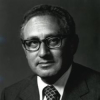Henry A. Kissinger

Henry A. Kissinger
Henry Alfred Kissingeris an American diplomat and political scientist. He served as National Security Advisor and later concurrently as United States Secretary of State in the administrations of presidents Richard Nixon and Gerald Ford. For his actions negotiating the ceasefire in Vietnam, Kissinger received the 1973 Nobel Peace Prize under controversial circumstances, with two members of the committee resigning in protest. Kissinger later sought, unsuccessfully, to return the prize. After his term, his advice has been sought by world leaders...
NationalityGerman
ProfessionStatesman
Date of Birth27 May 1923
CountryGermany
Far too often, the Ukrainian issue is posed as a showdown: whether Ukraine joins the East or the West. But if Ukraine is to survive and thrive, it must not be either side's outpost against the other - it should function as a bridge between them.
To have striven so hard, to have molded a public personality out of so amorphous an identity, to have sustained that superhuman effort only to end with every weakness disclosed and every error compounding the downfall--that was a fate of biblical proportions. Evidently the Deity would not tolerate the presumption that all can be manipulated; an object lesson of the limits of human presumption was necessary.
University politics make me long for the simplicity of the Middle East.
Whatever must happen ultimately should happen immediately.
With respect to the relationship between nuclear weapons and the advent of détente, one has to consider two things. One, the nature of nuclear weapons in themselves, and secondly, the advent of nuclear parity.
The essence of Richard Nixon is loneliness.
Baseball is the most intellectual game because most of the action goes on in your head.
Even paranoid people have enemies.
If you control the food, you control a nation. If you control the energy, you control a region. If you control the money, you control the world.
The nuclear weapons were not useful for the achievement of political objectives.
Left to its own devices, the State Department machinery tends toward inertia rather than creativity; it is always on the verge of turning itself into an enormous cable machine.
We have three things in common: Irish wives, the ability to speak for 17 minutes without a verb, and the fact that we both speak with an accent.
The key decision for a statesman is whether to commit his nation or not. There is no middle course. Once a great nation commits itself, it must prevail. It will acquire no kudos for translating its inner doubts into hesitation.
I don't have a brief for every single reaction of Israel, but I think it is important that the political negotiations occur free of the threat of terrorism.